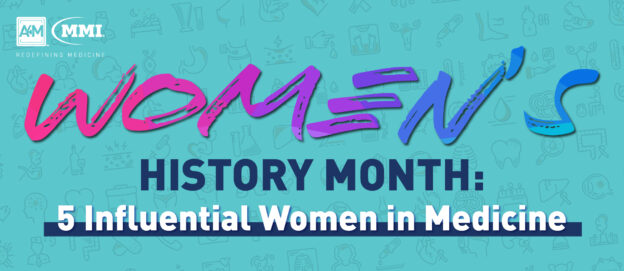Throughout history, women working in the medical field have had to tackle prejudice and discrimination while being largely excluded from science and medicine. In honor of Women’s History Month, A4M is spotlighting five female medical pioneers whose extraordinary contributions changed the practice of medicine, expanded modern-day knowledge and understanding of human health, and continue to inspire women pursuing careers in the field to this day.
Elizabeth Blackwell, MD 1821-1910
After being rejected by over 10 medical schools, Elizabeth Blackwell became the first woman in the United States to earn an MD degree. In 1857, Dr. Blackwell co-founded the New York Infirmary for Indigent Women and Children which served disadvantaged patients and supported women in their pursuit of medicine. She played a critical part in promoting medical education for women as a result of her book Pioneer Work in Opening the Medical Profession to Women.
Gerty Cori, PhD 1896-1957
An Austro-Hungarian-American biochemist, Gerty Cori uncovered the process of cellular energy storage and release referred to as the Cori Cycle. She worked closely with her husband, Carl Ferdinand Cori, in the field of preclinical science and genetics as well as endocrinology, focused primarily on the pituitary gland. In 1947, Gerty Cori became the first woman to win the Nobel Prize in medicine and physiology. Over the course of her lifetime, Cori received several other awards for her contributions to science and medicine.
Virginia Apgar, MD 1909-1974
Virginia Apgar is most recognized for her invention of the Apgar score, the gold standard vital test adopted by doctors to determine whether newborn babies required urgent medical care. After graduating from the College of Physicians and Surgeons at Columbia University, Dr. Apgar became the first director of Columbia-Presbyterian Hospital’s division of anesthesia. She is credited with tremendous contributions to the health of mothers and their newborns as well as public health and awareness of pre- and neonatal conditions.
Patricia Goldman-Rakic, PhD 1937-2003
Recognized for her studies of the brain, neuroscientist Patricia Goldman-Rakic furthered the modern day understanding of neurological diseases such as dementia, Alzheimer’s and Parkinson’s. She pioneered multidisciplinary research of the prefrontal cortex and working memory as well as studies of dopamine and its effects on the brain that expanded current knowledge of schizophrenia and attention deficit hyperactivity disorder.
Jocelyn Elders, MD 1933-
Dr. Jocelyn Elders was the first African American surgeon general of the United States and second woman to hold the position. Prior to this, she served in the army and attended the University of Arkansas Medical School graduating as the only woman in her class. Later in her career, Dr. Elders became the first board-certified pediatric endocrinologist in Arkansas. In 1987, Dr. Elders was selected as the head of the Arkansas Department of Health a position in which she doubled childhood immunization, expanded the state’s prenatal care, and increased support for elderly patients.
Through their dedication and perseverance, these and other female medial pioneers paved the path for future generations of women in medicine while contributing critical research and innovation that shaped the practice as we know it today.
To better comprehend the unique healthcare challenges faced by women – including highly specialized issues such as breast cancer, menopause, and hormonal concerns – clinicians are invited to complete our Women’s Hormones online course taking place from June 7-20, 2021 that will delve into the complexities of women’s hormonal care.

